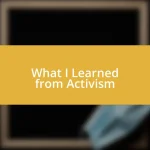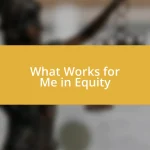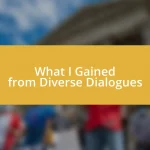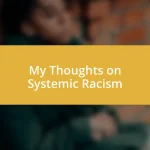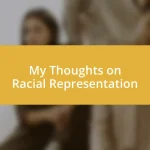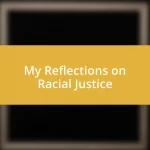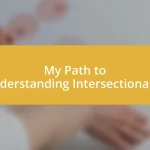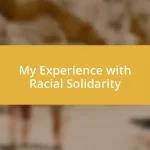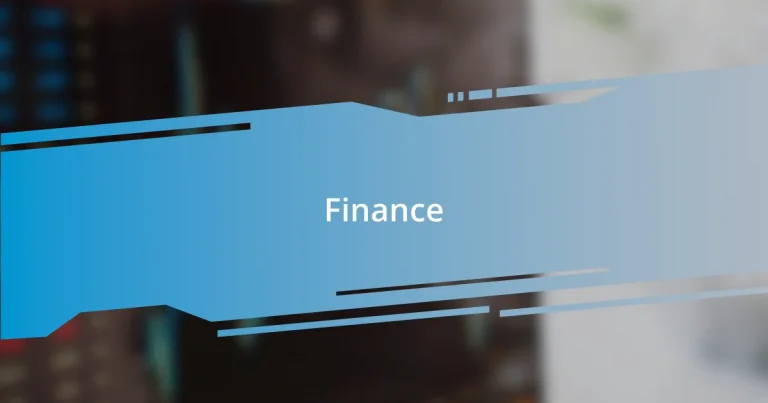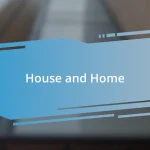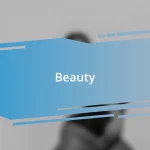Key takeaways:
- Discrimination often occurs in subtle ways, impacting individuals’ emotional well-being and sense of belonging, as highlighted by personal experiences of feeling overlooked and misunderstood.
- Various forms of discrimination, such as racial, gender, and age discrimination, affect people across different environments, leading to shared struggles that undermine confidence and self-worth.
- Advocating for change involves sharing personal stories to raise awareness, building supportive communities, and utilizing resources for empowerment, fostering connection and inspiring collective action against discrimination.
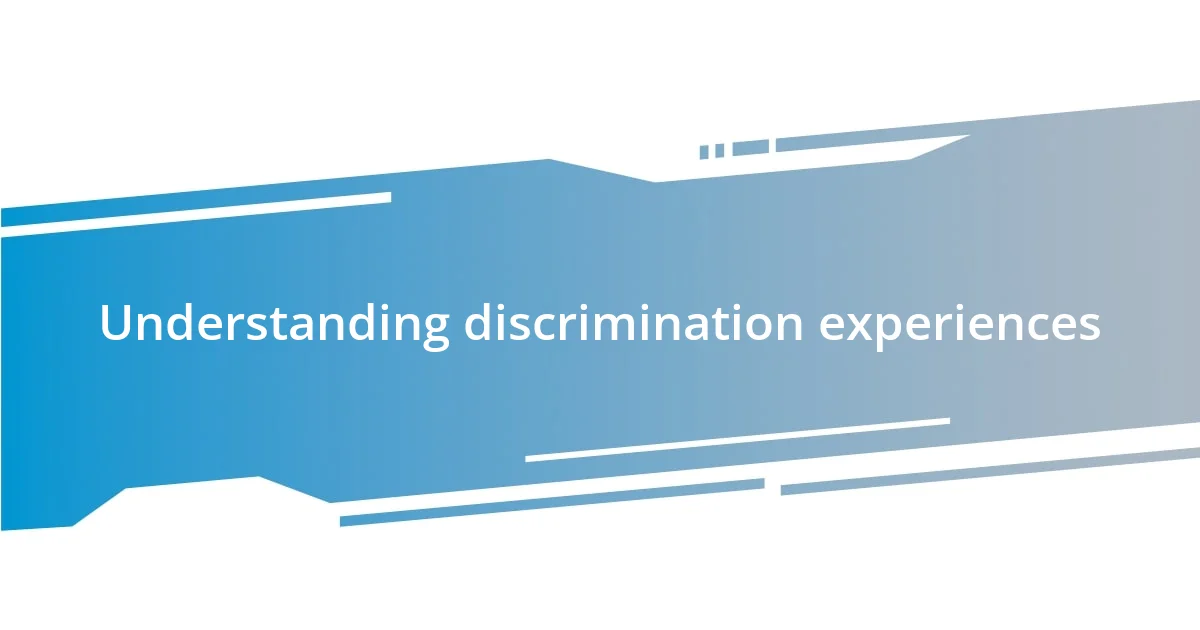
Understanding discrimination experiences
Discrimination often manifests itself in subtle, insidious ways. I remember a moment in high school when I was the only one overlooked for a leadership role in a group project, despite my contributions being as strong as my peers’. It stung deeply, and I found myself questioning whether my background played a role in that decision. Have you ever faced a similar situation, wondering if you were judged unfairly?
The emotional toll of such experiences can be profound. For me, it wasn’t just about the missed opportunity—it was about feeling invisible in a space where I wanted to belong. When I overheard classmates making offhand comments about my culture, I felt small and isolated. It’s disheartening to think how often this may happen to others, leaving lasting scars that shape their identities and self-worth.
Understanding discrimination goes beyond recognizing it in its overt forms; it often lies within the nuances of everyday interactions. I once spoke to a friend who shared a story of being followed in a store simply because of their appearance, which ignited a deep conversation between us about the biases we often ignore. Why do we accept these injustices as part of life when they should spark outrage and action?
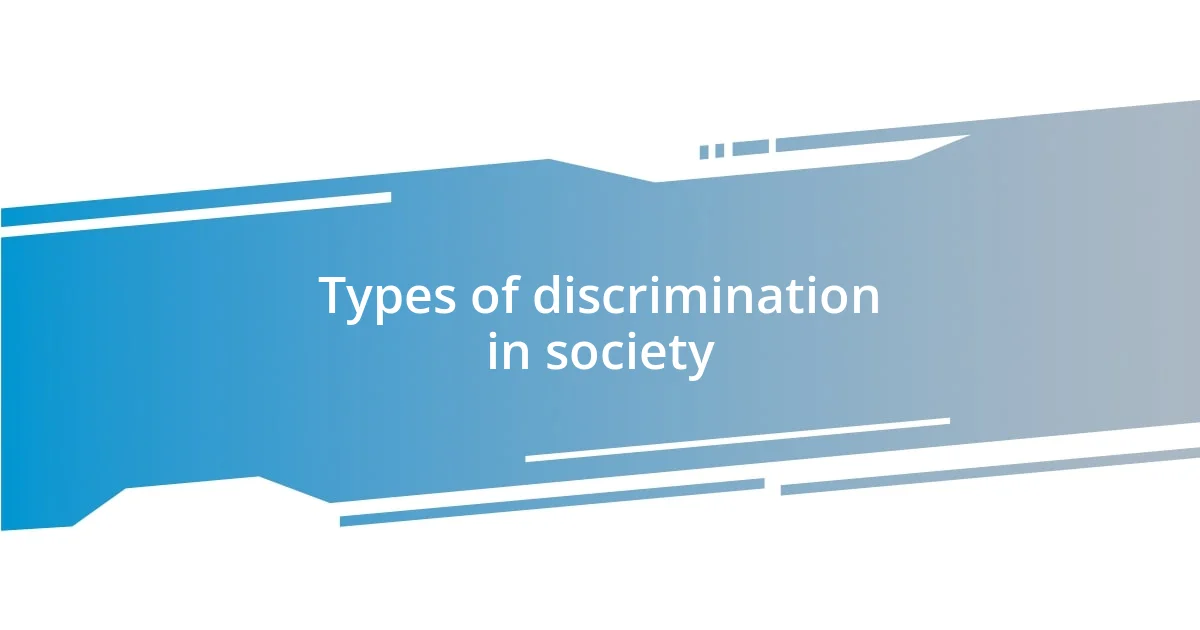
Types of discrimination in society
Discrimination comes in various forms, each leaving its mark on individuals and communities. One type that I personally encountered is racial discrimination, which I experienced during a job interview where the interviewer seemed primarily focused on my ethnic background rather than my qualifications. It was shocking to realize that my skills were overshadowed by preconceived notions, making me acutely aware of the biases that can exist even in professional environments.
Here are some common types of discrimination people face in society:
- Racial discrimination: Prejudice based on race or ethnicity, affecting job opportunities and social interactions.
- Gender discrimination: Unequal treatment based on one’s gender, often seen in workplaces and educational settings.
- Age discrimination: Bias against individuals based on their age, which can impact hiring practices or opportunities for advancement.
- Disability discrimination: Negative treatment of individuals with disabilities, often in the workplace or public spaces.
- Sexual orientation discrimination: Prejudice faced by LGBTQ+ individuals, which can manifest in various social and professional situations.
Each of these types confronts people with challenges that can undermine their confidence and sense of belonging, often pushing them to question their self-worth and place in society. I’ve talked with friends who have faced such discrimination, and the shared frustration and pain highlight just how pervasive these issues can be.
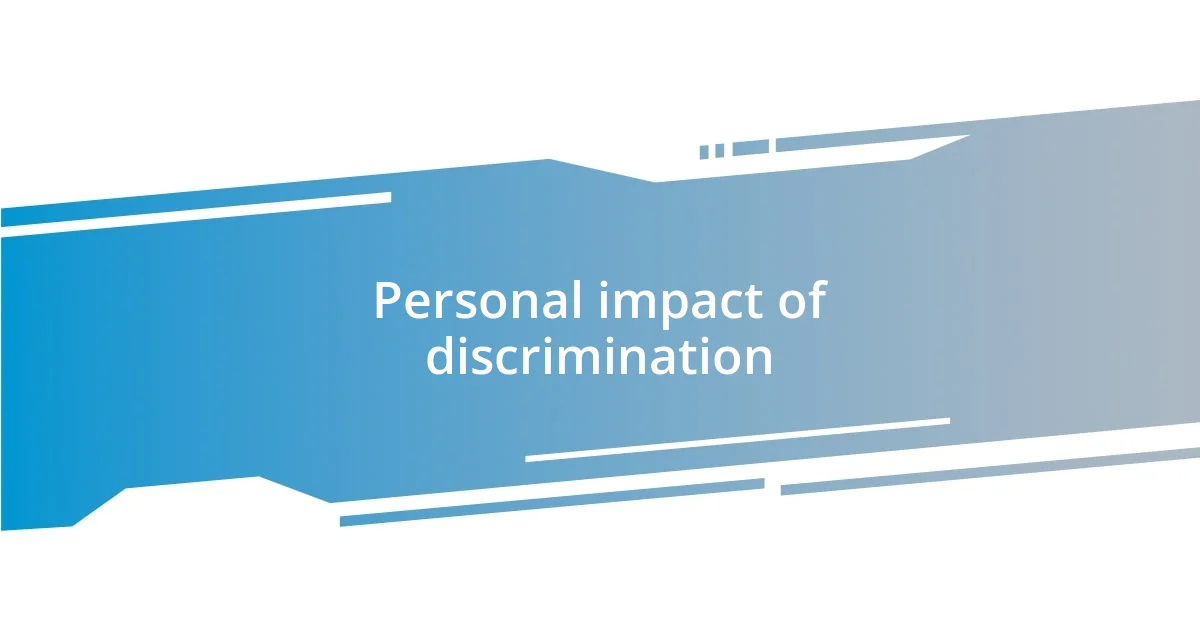
Personal impact of discrimination
Discrimination’s personal impact can linger long after the incident. I recall a time when I was spoken over in a meeting. It was a small moment, but it chipped away at my confidence. I often think back to that experience and wonder how many others silently suffer similar situations that stifle their voices.
The emotional implications run deeper than most might realize. I remember after being unfairly criticized in a group setting; feelings of anger mixed with shame consumed me for days. It felt as if the judgment wasn’t just about the task at hand but also a broader commentary on my capabilities. How many dreams go unpursued because someone internalizes the negative messages received?
Even the discussions around discrimination can bear heavy weight. I had a candid conversation with a close friend who shared how her experiences with gender bias made her second-guess her place in her field. She often felt like she had to prove herself more than her male colleagues. It’s heartbreaking to hear, yet it’s a common refrain in many spaces.
| Impact of Discrimination | Personal Experience |
|---|---|
| Emotional Toll | Feeling invisible and questioning self-worth |
| Confidence Erosion | Silent struggles after being dismissed in discussions |
| Relationships | Strain between friends as we navigate shared challenges |
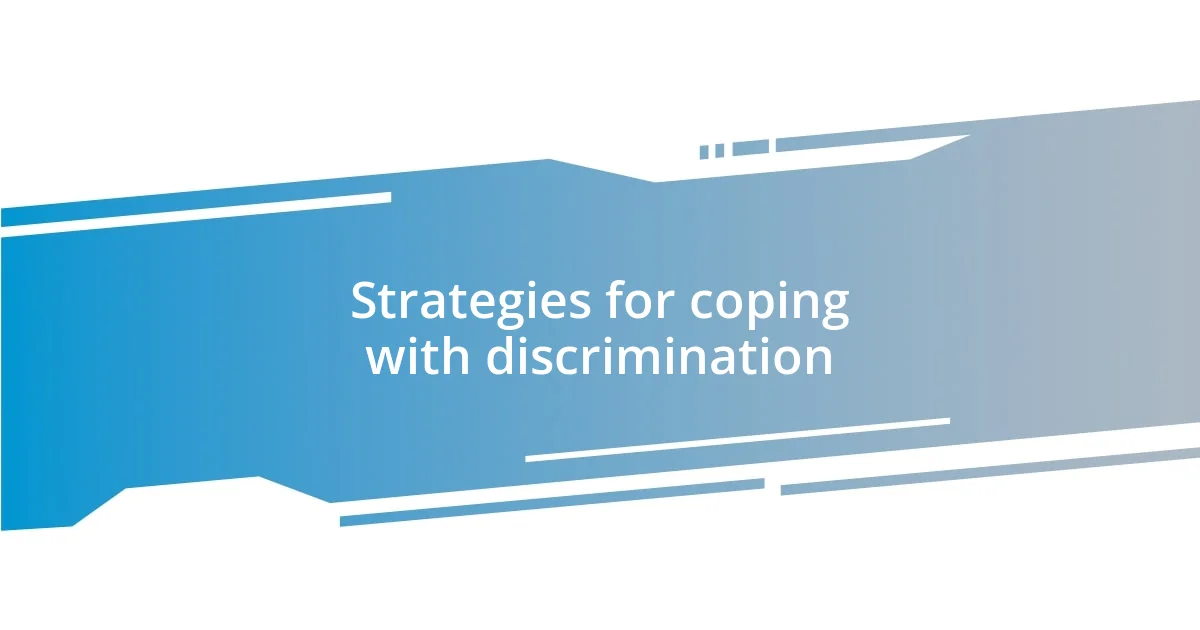
Strategies for coping with discrimination
Dealing with discrimination can be incredibly challenging, but I’ve found a few strategies that help me cope. One technique I’ve embraced is seeking out supportive communities. For instance, I joined a local group where individuals share their experiences and support one another. This sense of belonging has made a world of difference, reminding me that I’m not alone in my struggles. Have you ever experienced the relief that comes from connecting with others who truly understand?
Another strategy I’ve adopted is practicing self-affirmation. I vividly remember mornings when I would look in the mirror and recite positive affirmations about my worth and abilities. It felt silly at first, but these simple statements gradually reshaped my internal dialogue. Eventually, it became a ritual that fortified my resilience against the negativity I faced. What does self-affirmation look like for you?
Finally, I often turn to creative outlets to express my feelings. Writing about my experiences or even painting helps me process the emotions tied to discrimination. Recently, I completed a piece that encapsulated a powerful moment of feeling marginalized at work. The act of creating transformed my frustration into something tangible and meaningful. Have you considered how creativity might serve as an emotional release for you?
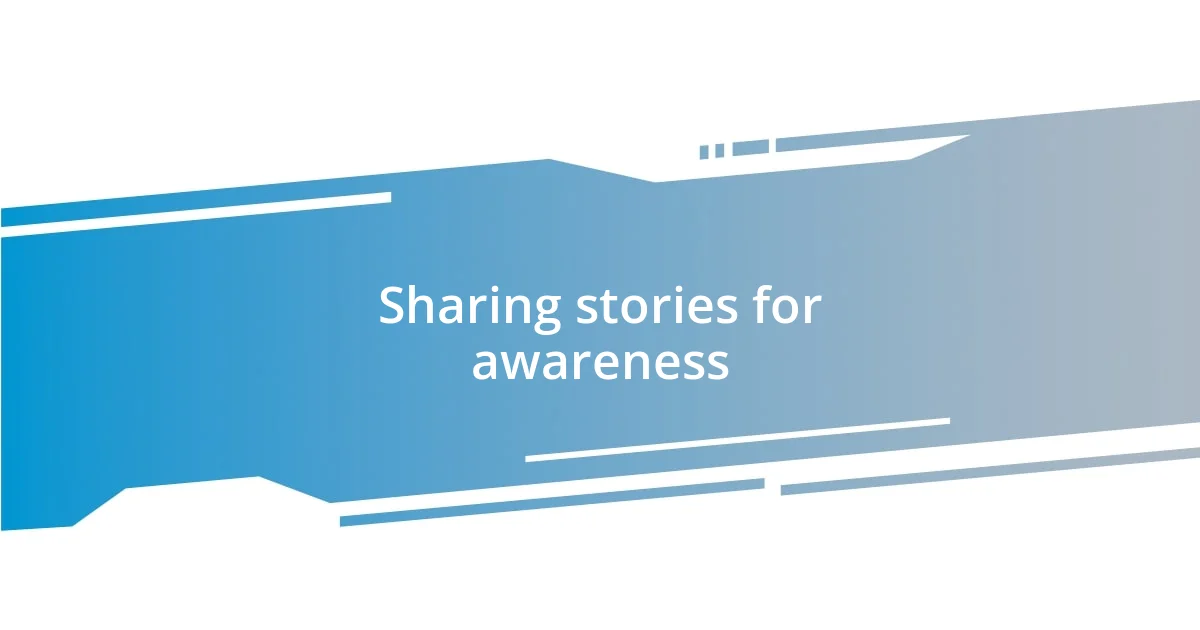
Sharing stories for awareness
Sharing stories is a powerful way to foster awareness about discrimination. I remember when I opened up about an experience of racial profiling in a group chat. The responses were overwhelming; people expressed shock and empathy, and for many, it was the first time they really understood the everyday implications of such encounters. Isn’t it fascinating how sharing personal stories can shift perceptions and ignite crucial conversations?
When we share our experiences, we create space for others to reflect on their own and realize they’re not alone in their struggles. In my case, after recounting a moment where I was overlooked for a promotion, several colleagues shared their similar stories. It was eye-opening to see how pervasive the issue really is. Why do we often hesitate to talk about these matters? I’ve learned that vulnerability can cultivate connection, urging more of us to step forward and share.
What resonates with me is that these stories don’t just aim to highlight problems; they also inspire change. I recall participating in a community workshop where everyone shared their narratives, and it sparked a collective commitment to advocate for equality in our workplace. Each voice contributed to a chorus demanding action. Have you ever thought about how your story might motivate someone else to take a stand?
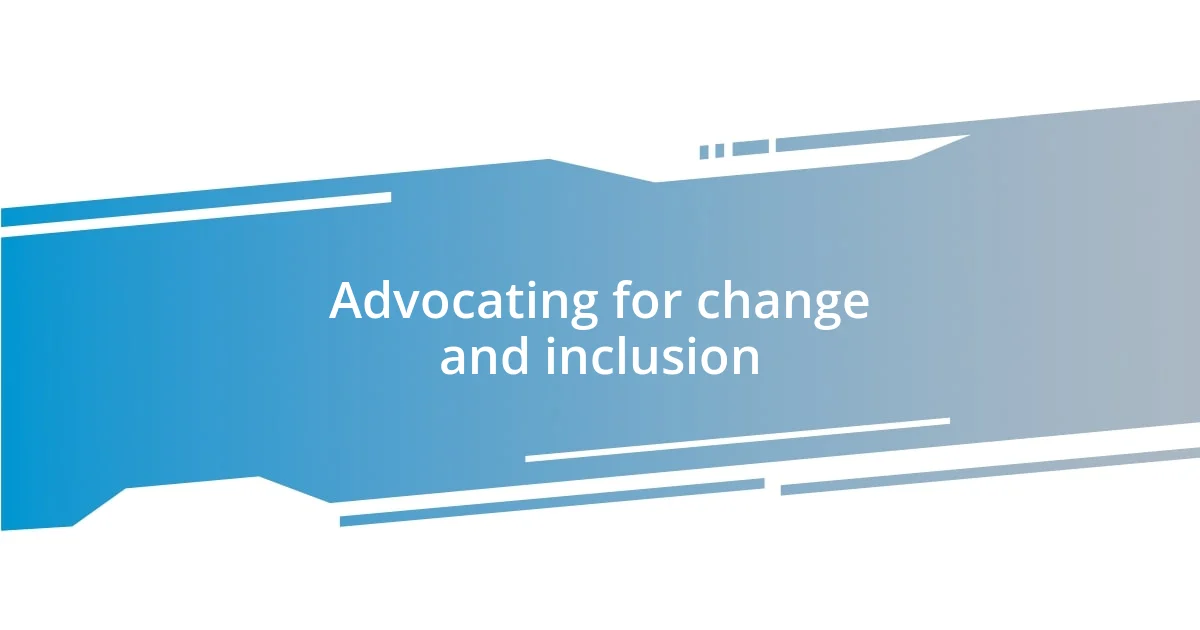
Advocating for change and inclusion
Advocating for change requires not just awareness, but action fueled by our personal experiences. I remember standing up during a meeting to address the subtle discrimination I witnessed in our hiring process. Saying it out loud brought an air of tension, but it also prompted others to chime in, validating my feelings and igniting a discussion on how we could reform our policies. Isn’t it empowering to realize that one person’s voice can trigger a wave of change?
It’s essential to embrace our individual narratives as tools for advocacy. In my community, I once helped organize a rally that showcased stories from local members who faced discrimination. Seeing people come together, sharing their truths, and advocating for our rights instilled a sense of hope. How often do we underestimate the impact our stories can have when we unite to fight for inclusion?
I also believe that seeking accountable allies plays a crucial role in this journey for change. I vividly recall confiding in a mentor about my experiences with discrimination, and their proactive support opened doors for discussions in leadership meetings. Together, we proposed training sessions to address unconscious bias within the organization. Have you connected with someone who encouraged you to take bold steps towards advocacy? It’s moments like these that reinforce the power of collaboration in creating a more inclusive environment for all.
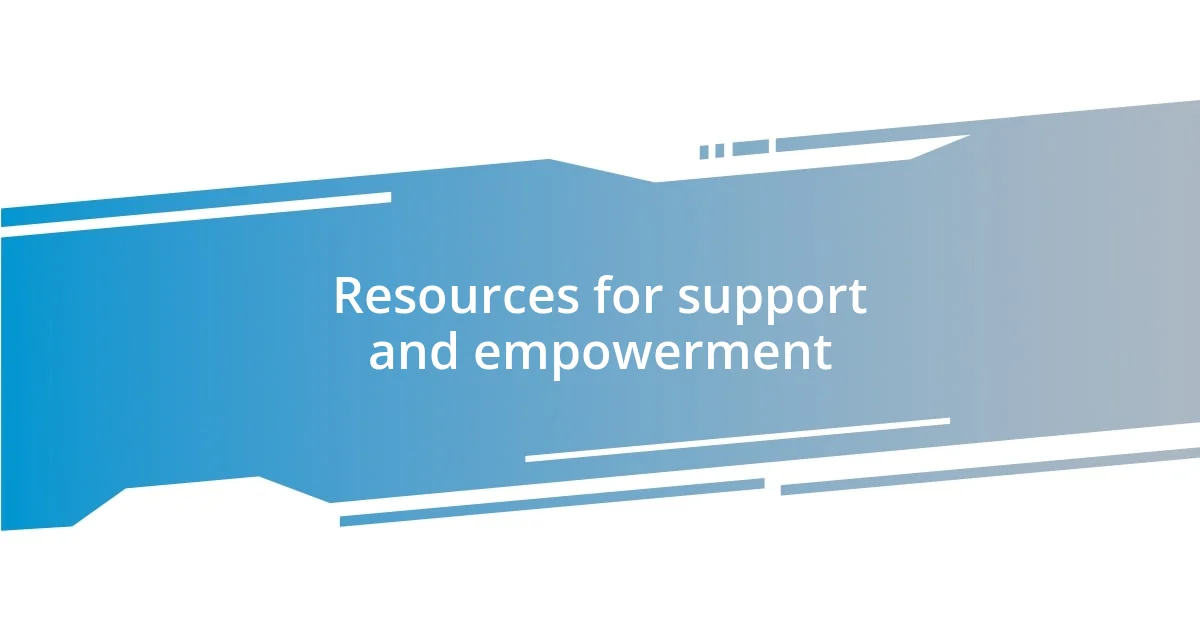
Resources for support and empowerment
Finding the right resources for support can be a transformative step in navigating experiences of discrimination. I remember stumbling upon a local support group that met weekly to discuss our shared challenges and strategies for empowerment. It was so refreshing to be surrounded by people who truly understood my struggles, and it made me realize how powerful community can be. Do you have a support network that listens and validates your experiences? It can make all the difference.
Another invaluable resource is educational workshops focused on resilience and self-advocacy. I once attended a seminar that taught us practical ways to assert ourselves in situations of bias. The techniques shared helped me feel more confident in voicing my concerns at work, ultimately leading to an open dialogue with my manager about inclusivity. Have you ever considered how learning can empower you to stand up for yourself? It’s empowering to transform knowledge into actionable steps.
Don’t underestimate the power of online platforms as well. I’ve found incredible support groups and forums where people share their experiences and coping strategies. Connecting with others digitally can provide both anonymity and a sense of belonging. Have you ever sought advice or solidarity from an online community? I’ve discovered that these spaces often foster incredible relationships that extend beyond the screen, offering both encouragement and friendship in the face of adversity.
